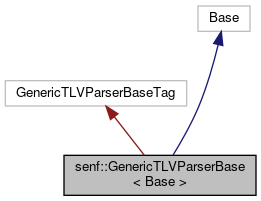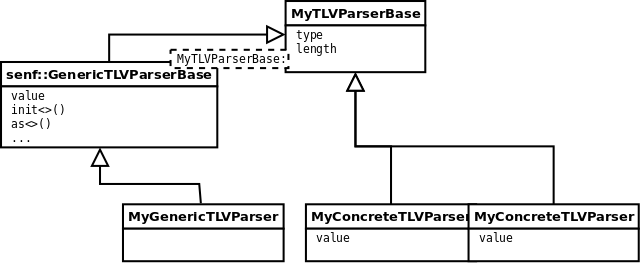senf::GenericTLVParserBase< Base > Class Template Reference
Base class for generic TLV parsers. More...
#include <senf/Packets/GenericTLV.hh>
Inheritance diagram for senf::GenericTLVParserBase< Base >:

Public Member Functions | |
| GenericTLVParserBase (PacketParserBase::data_iterator i, PacketParserBase::state_type s) | |
| PacketParserBase::size_type | bytes () const |
| void | init () const |
| template<class Parser > | |
| Parser | init () |
| template<class Parser > | |
| Parser | as () const |
| template<class Parser > | |
| bool | is () const |
| PacketInterpreterBase::range | value () const |
| void | dump (std::ostream &os) const |
| template<class ForwardReadableRange > | |
| void | value (ForwardReadableRange const &val) |
| template<class ForwardReadableRange > | |
| void | value (std::pair< typename Base::type_t::value_type, ForwardReadableRange > const &val) |
Static Public Attributes | |
| static PacketParserBase::size_type const | init_bytes = senf::init_bytes<Base>::value |
Detailed Description
template<class Base>
class senf::GenericTLVParserBase< Base >
Base class for generic TLV parsers.
This abstract base class can be used to define generic TLV parsers. The following class structure is assumed:

Your TLVParser base class has to define a type and a length field:
{
# include SENF_PARSER()
SENF_PARSER_FIELD ( type, senf::UInt8Parser );
SENF_PARSER_FIELD_RO( length, senf::UInt8Parser );
SENF_PARSER_FINALIZE( MyTLVParserBase );
};
Your concrete TLV parsers will inherit from this base class and have to define a specific
value field and a \c typeId member:
struct MyConcreteTLVParser : public MyTLVParserBase
{
# include SENF_PARSER()
SENF_PARSER_INHERIT ( MyTLVParserBase );
SENF_PARSER_FIELD ( myValue, senf::UInt32Parser );
SENF_PARSER_FINALIZE( MyConcreteTLVParser );
SENF_PARSER_INIT() {
type() = typeId;
length_() = 4;
}
static const type_t::value_type typeId = 0x42;
};
With GenericTLVParserBase you can define a generic parser class which provides
members to access the value data and and to cast the parser to a concrete tlv
parser:
{
typedef senf::GenericTLVParserBase<MyTLVParserBase> base;
MyGenericTLVParser(data_iterator i, state_type s) : base(i,s) {}
// members for your generic TLV parser...
};
If your generic TLV parser just inherits from GenericTLVParserBase and doesn't
add any additional functionality you can use a simple \c typedef as well:
typedef senf::GenericTLVParserBase<MyTLVParserBase> MyGenericTLVParser;
This generic tlv parser can now be used for example in a list:
{
# include SENF_PARSER()
SENF_PARSER_FIELD_RO( list_length, senf::UInt8Parser );
SENF_PARSER_LIST ( tlv_list, list_length, MyGenericTLVParser );
SENF_PARSER_FINALIZE( MyTestPacketParser );
};
Now, you can access the TLV parsers in the list in a generic way or you
can cast the parsers to some concrete tlv parser:
MyTestPacket p (...
typedef MyTestPacket::Parser::tlv_list_t::container_type container_t;
container_t tlvContainer (p->tlv_list() );
optContainer_t::iterator listIter (tlvContainer.begin());
// listIter points to a MyGenericTLVParser, so you have generic access:
listIter->type() = 0x42;
listIter->value(someRangeOfValueData);
// cast to an instance of MyConcreteTLVParser:
if (listIter->is<MyConcreteTLVParser>()) {
MyConcreteTLVParser concreteTLVParser (listIter->as<MyConcreteTLVParser>());
concreteTLVParser.myValue() = 0xabababab;
}
// add a MyConcreteTLV to the list:
MyConcreteTLVParser tlv (tlvContainer.push_back_space().init<MyConcreteTLVParser>());
tlv.myValue() = 0xffff;
\see
IPv6GenericOptionParser, WLANGenericInfoElementParser, MIHGenericTLVParser \n
GenericTLVParserRegistry
Definition at line 124 of file GenericTLV.hh.
Constructor & Destructor Documentation
◆ GenericTLVParserBase()
template<class Base>
|
inline |
Definition at line 129 of file GenericTLV.hh.
Member Function Documentation
◆ as()
template<class Base>
template<class Parser >
| Parser senf::GenericTLVParserBase< Base >::as | ( | ) | const |
◆ bytes()
template<class Base>
| PacketParserBase::size_type senf::GenericTLVParserBase< Base >::bytes | ( | ) | const |
◆ dump()
template<class Base>
| void senf::GenericTLVParserBase< Base >::dump | ( | std::ostream & | os | ) | const |
◆ init() [1/2]
template<class Base>
| void senf::GenericTLVParserBase< Base >::init | ( | ) | const |
◆ init() [2/2]
◆ is()
◆ value() [1/3]
template<class Base>
| PacketInterpreterBase::range senf::GenericTLVParserBase< Base >::value | ( | ) | const |
◆ value() [2/3]
template<class Base>
template<class ForwardReadableRange >
| void senf::GenericTLVParserBase< Base >::value | ( | ForwardReadableRange const & | val | ) |
◆ value() [3/3]
template<class Base>
template<class ForwardReadableRange >
| void senf::GenericTLVParserBase< Base >::value | ( | std::pair< typename Base::type_t::value_type, ForwardReadableRange > const & | val | ) |
Member Data Documentation
◆ init_bytes
template<class Base>
|
static |
Definition at line 132 of file GenericTLV.hh.
The documentation for this class was generated from the following file: